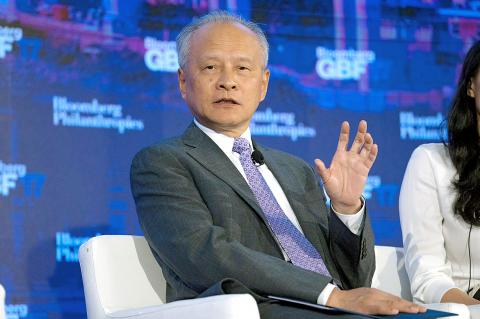Prior to the US House Committee on Foreign Affairs’ passage of a bill that would relax restrictions on mutual visits of high-level officials from Taipei and Washington, China allegedly sent a letter to the US Congress warning against “crossing a red line,” according to the Washington Post.
In a hearing in Washington on Thursday, the committee unanimously passed the Taiwan travel act bill, which seeks to encourage visits between Taiwan and the US at all levels at a time when bilateral ties “have suffered from insufficient high-level communication due to the self-imposed restrictions that the US maintains on high-level visits with Taiwan” since the 1979 enactment of the Taiwan Relations Act.
Although Chinese pressure about Taiwan has become commonplace, Josh Rogin of the Washington Post said the article published earlier on Thursday that a threat-laden letter sent by Chinese Ambassador to the US Cui Tiankai (崔天凱) to leaders of the US House’s and Senate’s foreign relations and armed serves committees in August was considered “unusual and out of line.”

Photo: Bloomberg
Rogin, who claimed to have obtained a copy of the letter, said Cui expressed “grave concern” about the Taiwan travel act bill, as well as other proposed laws or provisions considered friendly toward Taipei, such as the Taiwan security enhancement act bill — which aims to enhance the security of Taiwan and bolster its participation in the international community.
The Chinese ambassador said the bills represented “provocations against China’s sovereignty, national unity and security interests” and “have crossed the red line on the stability of the China-US relationship,” Rogin wrote, citing the letter.
Cui urged the leaders of the committees to use their power to block the bills, Rogin added.
He said Cui’s letter has met with criticism, quoting US Representative Eliot Engel, a ranking member of the foreign affairs committee, as saying that “the letter stood out because of its threatening tone” and that “it is interesting to me that they [China] now feel that they can get away with these kind of threats and vague pressure tactics with the US Congress.”
An anonymous Senate aide told Rogin that such threats and imposition of red lines on US domestic legislative action “is neither helpful nor constructive to build the sort of relationship needed between the US and China.”
When asked to comment on the matter yesterday, the Mainland Affairs Council thanked the US Congress for valuing Taiwan-US interaction.
The ministry expressed the hope that Washington would continue to adhere to the Taiwan Relations Act and the “six assurances” issued by then-US president Ronald Reagan in 1982, support Taiwan’s promotion of policies aimed at ensuring cross-strait peace and stability, and strengthen bilateral Taiwan-US ties.
“These measures could help China adopt a practical and rational attitude, and respect Taiwan’s dignity and interests,” the council said, adding that Taiwan is a sovereign state that is entitled to develop relationships with other nations.

Taiwanese actress Barbie Hsu (徐熙媛) has died of pneumonia at the age of 48 while on a trip to Japan, where she contracted influenza during the Lunar New Year holiday, her sister confirmed today through an agent. "Our whole family came to Japan for a trip, and my dearest and most kindhearted sister Barbie Hsu died of influenza-induced pneumonia and unfortunately left us," Hsu's sister and talk show hostess Dee Hsu (徐熙娣) said. "I was grateful to be her sister in this life and that we got to care for and spend time with each other. I will always be grateful to

UNITED: The premier said Trump’s tariff comments provided a great opportunity for the private and public sectors to come together to maintain the nation’s chip advantage The government is considering ways to assist the nation’s semiconductor industry or hosting collaborative projects with the private sector after US President Donald Trump threatened to impose a 100 percent tariff on chips exported to the US, Premier Cho Jung-tai (卓榮泰) said yesterday. Trump on Monday told Republican members of the US Congress about plans to impose sweeping tariffs on semiconductors, steel, aluminum, copper and pharmaceuticals “in the very near future.” “It’s time for the United States to return to the system that made us richer and more powerful than ever before,” Trump said at the Republican Issues Conference in Miami, Florida. “They

TAIWAN DEFENSE: The initiative would involve integrating various systems in a fast-paced manner through the use of common software to obstruct a Chinese invasion The first tranche of the US Navy’s “Replicator” initiative aimed at obstructing a Chinese invasion of Taiwan would be ready by August, a US Naval Institute (USNI) News report on Tuesday said. The initiative is part of a larger defense strategy for Taiwan, and would involve launching thousands of uncrewed submarines, surface vessels and aerial vehicles around Taiwan to buy the nation and its partners time to assemble a response. The plan was first made public by the Washington Post in June last year, when it cited comments by US Indo-Pacific Commander Admiral Samuel Paparo on the sidelines of the Shangri-La Dialogue

REMINDER: Of the 6.78 million doses of flu vaccine Taiwan purchased for this flu season, about 200,000 are still available, an official said, following Big S’ death As news broke of the death of Taiwanese actress and singer Barbie Hsu (徐熙媛), also known as Big S (大S), from severe flu complications, the Centers for Disease Control (CDC) and doctors yesterday urged people at high risk to get vaccinated and be alert to signs of severe illness. Hsu’s family yesterday confirmed that the actress died on a family holiday in Japan due to pneumonia during the Lunar New Year holiday. CDC Deputy Director-General Tseng Shu-hui (曾淑慧) told an impromptu news conference that hospital visits for flu-like illnesses from Jan. 19 to Jan. 25 reached 162,352 — the highest